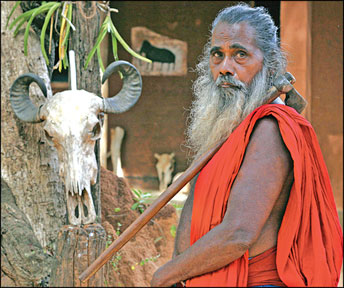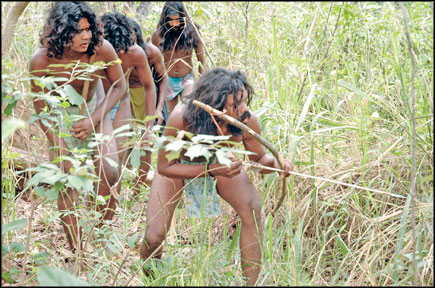|
International Day of the World’s Indigenous People :
Veddah community: ‘Our history and heritage’
By Indunil THENUWARA
 Sri Lanka’s indigenous people need no introduction; even a small
child would have heard of the Adi Vasi, Vanniyela Aththo (forest
dwellers) or Veddah community though only a few may have seen or talked
to them. They are the descendants of the island’s original occupants and
have a history dating back to around 16,000 BC. Sri Lanka’s indigenous people need no introduction; even a small
child would have heard of the Adi Vasi, Vanniyela Aththo (forest
dwellers) or Veddah community though only a few may have seen or talked
to them. They are the descendants of the island’s original occupants and
have a history dating back to around 16,000 BC.
Indigenous communities are not unique to Sri Lanka. The Red Indians
of America, Aborgines of Australia and Maori of New Zealand are some of
the better known of the many indigenous people of the world. Over 300
million indigenous people live in about 70 countries today, and comprise
four percent of the global population. Despite being united by common
experiences including a history of marginalisation and struggles for
cultural survival, they are distinct and different.
Indigenous communities are the original occupants of the land they
live in. Although some of them have now integrated themselves to the
general population and contribute to national economies, some continue
to live separately in their own groups.
A grave danger all indigenous communities are facing today is the
threat of extinction. Due to the expansion of cities and the resultant
loss of livelihood and their way of life, and new generations leaving
the communities seeking a modern life, their numbers are fast dwindling.
Tomorrow is the ideal day to focus on the world’s indigenous
communities and their problems and increase awareness about them as it’s
the International Day of the World’s Indigenous People. The UN-declared
day will be celebrated for the 16th time this year.
The international observances will take place at the UN Headquarters
from 2.00 p.m. to 5.00 p.m. tomorrow. The theme for this year is
‘Celebrating indigenous film-making’ and will focus on and appreciate
the work produced by indigenous film-makers all over the world.
The event is organised by the Secretary of the United Nations
Permanent Forum on Indigenous Issues in co-operation with the NGO
Committee on International Decade of the World’s Indigenous Peoples.
Main events
In Sri Lanka, the main program in connection with the event,
organised by the National Heritage and Cultural Affairs Ministry in
association with the Presidential Secretariat and other ministries and
institutions, will take place , on September 25. However, Variga Sabha ,
a traditional annual event organised by the Adi Vasi community of
Dambana will take place tomorrow in the village .
The event in September will see many projects being launched for the
benefit of the Vanniyela Aththo in Dambana as well as in a few other
areas of the country.
 Additional Secretary (Cultural Promotions) of the National Heritage
and Cultural Affairs Ministry, H. D. S. Malkanthi told the Sunday
Observer that a host of projects are in the pipeline with the goal of
improving the lot of Sri Lanka’s Adi Vasi community. Additional Secretary (Cultural Promotions) of the National Heritage
and Cultural Affairs Ministry, H. D. S. Malkanthi told the Sunday
Observer that a host of projects are in the pipeline with the goal of
improving the lot of Sri Lanka’s Adi Vasi community.
Sri Lanka’s Adi Vasi community is spread across the villages
Henanigala and Pollebedda in Ampara, Hathugala in Moneragala, Dambana in
Badulla, Dalukana in Polonnaruwa and Vakarai in Batticaloa. They live in
clans and still carry their axes, bows and arrows over their shoulders.
Despite living among other communities with some of them even securing
higher education, most continue to retain their age-old customs and
traditions.
However, modernity hasn’t completely passed them by; due to many of
these reasons, the numbers of Vanniyela Aththo have decreased from 4,510
in 1921 to 2,361 in 1946. No separate count on their population has been
carried out since 1963. The Ministry of National Heritage and Cultural
Affairs and the University of Colombo will carry out a survey due to
lack of statistics in this arena. According to the Additional Secretary,
the major projects which are being carried out are to fulfill some of
the requests made by the indigenous communities to the authorities.
Tribal schools
Massive irrigation projects to provide water to the Adi Vasi
villages; gathering and preserving their rock art and promoting
traditional rites and rituals; a project with the Ayurveda Research
Institute to teach the younger generations of these communities about
their indigenous food and medicines and also to release such information
in book form; and a well-equipped museum to showcase their customs and
traditions are some of the plans in the offing.
A request had also been made by the community for the establishment
of tribal schools to teach the children their language and way of life.
Accordingly, steps will be taken to set up such schools in the Adi Vasi
villages with the co-operation of the local authorities of those areas.
Such a school exists only in Dambana at present, Malkanthi said.
Helping the Adi Vasis with houses built according to their
requirements and construction of roads in their villages are other
projects to be carried out by the Government.
The support of many bodies including the National Housing Development
Authority, Road Development Authority, Irrigation Department and Health
Ministry will be forthcoming for these projects. According to Malkanthi,
“The Adi Vasis are our history and heritage. All of us should get
together to protect them and preserve their way of life”.
*********
The United Nations General Assembly decided to celebrate this day on
August 9 by a resolution on December 23, 1994 during the International
Decade of the World’s Indigenous People, which had started on December
10, 1994. The date marks the day of the first meeting in 1982 of the UN
Working Group on Indigenous Populations of the Subcommission on the
Promotion and Protecting of Human Rights in Geneva.
In April 2000, the Commission on Human Rights adopted a resolution to
establish a Permanent Forum on Indigenous Issues which was endorsed by
the Economic and Social Council in July 2000. The mandate of the Forum
is to discuss indigenous issues related to culture, economic and social
development, education, environment, health and human rights. The UN
General Assembly proclaimed 1993 as the International Year of the
World’s Indigenous People.
The second International Decade of the World’s Indigenous People was
proclaimed in 2004 as the period between 2005 and 2014. The goal is to
further strengthen international co-operation for solving problems faced
by indigenous communities in the areas of culture, education, health,
human rights, environment and social and political development. In April
2000, the Commission on Human Rights adopted a resolution to establish
the UN Permanent Forum on Indigenous Issues that was endorsed by the
Economic and Social Council, the forum mandated to discuss issues
related to cultural, economic and social development, education, health
and human rights.
*********
|

